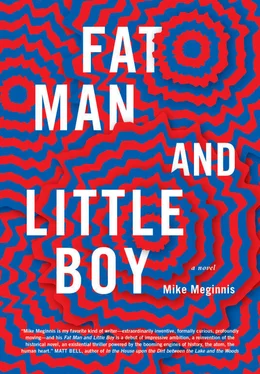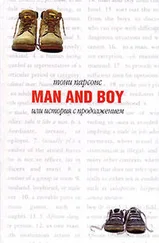She feels an urgent warmth against her belly. There is nothing there. There is a hot nothing, a wanting nothing, pleading nothing, thirsty nothing, loving, lonely, grasping nothing, nothing, urgent warmth against her belly. Like the visitors downstairs, it wants in.
The brother bombs wake to the sounds of stairs straining beneath a man too tired for stealth. The staircase is behind them and they are afraid to sit up. Fat Man looks to the bust on the mantel as if its reaction could tell him what’s coming. Pétain is calm, his eyes are blank as ever. The tired man makes the floorboards cry for help.
A pistol lowers itself from over the back of the couch. It dangles over Fat Man’s cheek like a hanging tongue, though dry and cold. He feels around him in the blanket for help. It’s wet. He understands he’s had a wet dream. Under other circumstances he would like to take a moment to remember it—what he dreamed, or rather who—and savor the memory. Now, staring sideways up the barrel of a gun, he remembers the imagined feeling of a woman’s hips melting in his iron grip. He chokes it down. He tells the first lie he learned to say in French. “We are not vagrants.”
The gunman prods the fat man’s cheek with his lethal probe. He uses it to pull Fat Man’s eye open wider. The gunman peers inside.
“Are you Francine’s husband?” asks the fat man. The gunman nods. He is a handsome man with thick black hair, sharp wide eyes, and a nose like some ripe lovely root, with a pink, glowing tip. There are bags under his eyes and his hair is mussed—it stands on end in the front. The fat man smiles up at him, spreading his jowls like curtains. “I’m John,” he says. “It’s good to meet you.”
The gun points down his open mouth.
“Albert,” Francine shouts, running down the stairs. She vomits language—what must be French. People say it’s a beautiful tongue. Sometimes, reflects Fat Man. Not always. Albert answers in low, measured sentence fragments, nodding or shaking his head, gun still trained on the fat man.
“I’m sorry my husband’s an asshole,” she says to the brothers. Then back to the fight. She pulls his gun arm up and away from the fat man. She wrenches the weapon from his hand. He doesn’t fight back. She tries to empty the chambers, but they’re already empty. She wrings the air as if it were his neck. He shrugs.
“It’s safer that way,” says Albert.
Fat Man is proud to understand him.
Albert says, “What if he knocked it out of my hand and turned it on me? Do you want me to die?”
“What’s happening?” says groggy Little Boy, whose French is not coming along.
“Or what if I accidentally shot him?” asks Albert. He takes back the gun from his wife and tucks it in his belt like a bank robber.
Francine slaps her own forehead demonstratively. She says, perhaps believing John can’t understand her, “Where were you all night?”
Albert answers in a whisper, perhaps out of shame, perhaps realizing the fat one understands them.
Fat Man motions to Little Boy that it’s time to get up and go. The little boy wants to hide beneath his blanket. Instead he stands up, brushes grit off his clothing, and begins to dress. He pulls on his pants over his shorts, his discolored jacket over his ragged shirt the hue of an old smoker’s teeth. The fat man is doing the same. He struggles with suspenders so tested they might give way any second. The jacket feels like it wants to strangle him—any thoughts of buttoning it closed are instantly forgotten.
Fat Man listens in as Francine whispers to her husband an explanation of the guests’ presence. She offers something about being homeless, pathetic, without work. Something about how cute the child Matthew is, and something about how hungry they look. The husband laughs, probably thinking of the fat one’s suspenders. Francine interrupts herself twice to smile at the fat man. He can see she likes to reassure people. The husband goes into the kitchen, gun still hanging from his belt, and lights a cigarette. He puts his feet on the table. Somehow it looks like they belong there.
Francine makes them breakfast while the brothers sit at the table listening to the English version of the conversation she and her husband just had. This time no one is pathetic or hungry. It’s not clear how much her husband follows. He nods when she’s not talking. He ashes his cigarette onto a scrap he tore from the newspaper he’s reading. Little Boy draws small shapes on the table’s surface with his own grease and sweat.
When she’s done talking and the sizzle of eggs and sausages fills the air, John starts filling in the gaps. “We thought we brought enough money but we had to bribe several men to get through the border.”
“You’re lucky it wasn’t more,” says Francine, tending to the sausages in the pan.
“It’s sleazy but I guess to be expected.”
Albert chimes in, “Everything is chaos.”
Little Boy Matthew turns his own collapsing hat in circles on top of his head.
Fat Man John continues, “We’ve found odd jobs here and there but it’s hard. Of course as things return to normal, people want to give the jobs to Frenchmen. I understand that.” He looks at the hard, slow curve of Francine’s shoulders and the slope of her back. She wears a light yellow dress with a flower print. He says the thing that everybody wants to hear him say—the thing they wait to hear without knowing they wait. “I guess it was a mistake to come here, especially with him.”
Little Boy pushes down his beaten hat until it covers the tops of his ears and his eyes.
“We’ve traveled much of the country, starting at the coast, moving south. It’s so beautiful. I regret bringing little Matthew, I guess, though I’m all he’s got. But I don’t really regret coming.” He reaches for his brother’s hand. This time Little Boy remembers not to recoil. Their hands are hot when they touch. “I’d just like to find some simple work so we can establish ourselves. He’s happy to work as well, until we can get him back into school.”
Albert taps more ash onto the newspaper fragment. He turns a page. As he shifts his weight, his gun clicks against the chair where it hangs from his belt.
An empty thing can be so ominous.
Albert says something to Francine. She straightens her back and turns to look at them each. First her husband, then John. She says, “He wants to know what happened to your hands.”
“How do you mean?” Of course he knows what she means.
“Your palms,” she says.
He shows Albert the blackness of the soft parts of his hands, the heels and inner knuckles. “I burnt them,” he says. “On a burning tree.”
Francine translates. Albert smiles and gestures with his cigarette as if to say, All’s well then.
Francine serves up breakfast. Fat Man takes his time. He doesn’t ask for seconds. As he chews he thinks what it would be like to hit Albert, and though its chambers are empty he wonders how fast he would need to move to get the gun.
Albert goes to his office without the gun. He manages money—his own, the money of others, it’s not clear, Fat Man doesn’t ask. Francine brings the brothers to a restaurant that serves sandwiches, salads, and coffees spiked and sweetened with mint and fruit liquors. She knows the owner. She goes into the kitchen while Fat Man and Little Boy sit at a table inside and watch the handful of patrons—all of them half asleep, drinking from blue ceramic mugs and smiling lazily when the shift’s only waiter walks past, tipping sugar into their cold coffee and stirring with brown-stained fingers. There are several women among them, all would-be Parisians compromising with practicalities of budget and scarcity in pursuit of the improvisational fashions from up north. Their skins, like the skins of most here, are damaged; plagued by boils and rashes that rose up in the hunger and deprivation under Nazis and Vichy. One is missing several teeth. Another has very thin hair. They do their best to simulate their former beauties. They are rowing upstream against time.
Читать дальше












